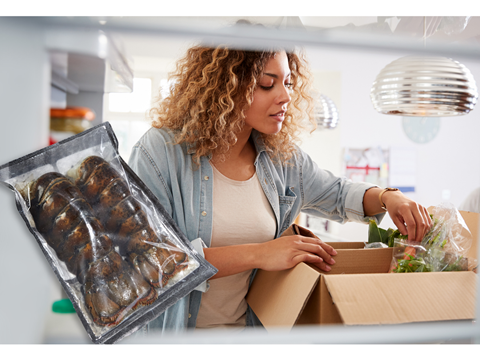
Aptar Food Protection, part of Aptar, has developed the SeaWell active packaging solution for seafood, designed to help maintain freshness, quality and aesthetics, currently being utilized by retailers across the U.S.
Apparently, the system allows frozen-to-thaw distribution and the integrated technology is said to absorb excess liquids that would otherwise accumulate around seafood, causing potential product breakdown and negatively impacting both freshness and appearance.
The SeaWell packaging reportedly utilizes food contact-safe absorbent materials embedded into its Drip-Lock technology to trap excess fluids inside patented pockets or wells. Aptar Food Protection says this separation reduces the rate of seafood microbial growth, chemical degradation and odour accumulation.
The technology has now been adopted for direct-to-consumer shipping of various seafood items including filets, whole fish and shellfish like crab legs, scallops and shrimp. The company states that in response to customer feedback, two home delivery companies have adopted the SeaWell technology for their seafood-based meal kits, hoping to improve consumer experiences with case-to-cook convenience and cleaner handling in the kitchen.
“The home delivery companies we work with are always listening to the voice of the consumer and making packaging changes to improve user experiences to promote customer loyalty,” said Michael Stephens, CEO of Bama Sea Products. “In particular, shrimp tends to be a prominent cause of customer complaints in the home delivery sector due to leaking, messy handling, and cross-contamination with other proteins. We were delighted to be able to work with Aptar to develop an appropriate SeaWell packaging solution for this market and bring it to commercialization.”
Last year, SÜDPACK revealed its Multifol Extreme base film, said to offer thinner and more lightweight thermoforming packaging in vacuum and MAP applications for fish products. The film aimed to facilitate lower costs and emissions across the value chain.
More recently, Sainsbury’s announced plans to sell its own-brand chicken and fish lines in kerbside recyclable cardboard trays, intending to save 694 tonnes of plastic annually. The company stated that all own-brand salmon fillet trays from would now be packaged in cardboard made from sugarcane pulp and lined with a polyethylene film.
If you liked this story, you might also enjoy:
How are the top brands progressing on packaging sustainability?
Sustainable Innovation Report 2024: Current trends and future priorities
Reuse vs. single use – which is better for the environment?
The ultimate guide to global plastic sustainability regulation














No comments yet